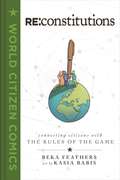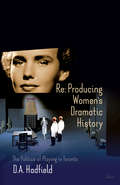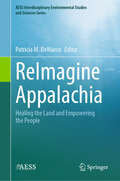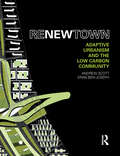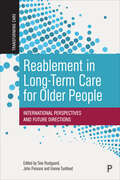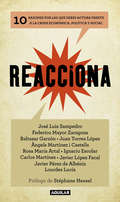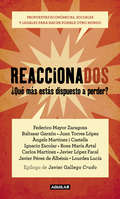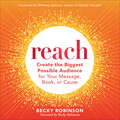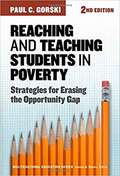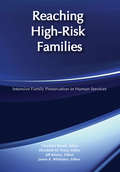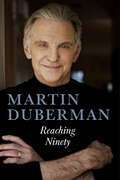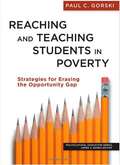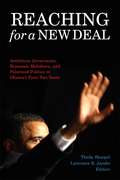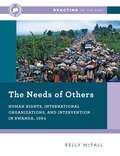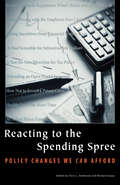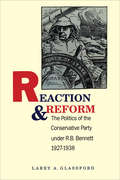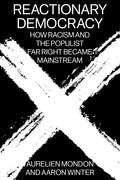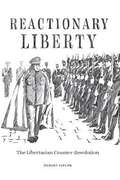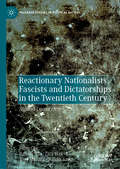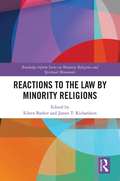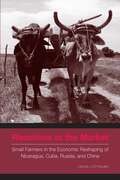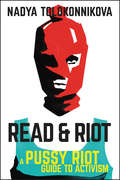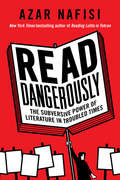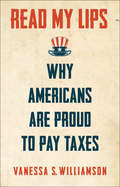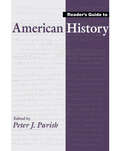- Table View
- List View
Re: Connecting Citizens with the Rules of the Game (World Citizen Comics)
by Beka FeathersThe next volume in the World Citizen Comics series, Re: Constitutions explains the role constitutions play in how government is structured and provides context for the modern issues that arise from these documents.Marcus is stumped by a summer assignment: to write an essay on what it means to be a citizen. He’s surprised to hear from people in his community that constitutions play an important role when it comes to citizenship—they can even affect whether you feel like you belong in your country or not. From a Kosovo Albanian neighbor to a Rwandan exchange student, and even in his own family history, Marcus discovers stories of how constitutions—including the U.S. Constitution—shape the political landscape and our daily lives.From Beka Feathers, an expert in post-conflict institution building, and Kasia Babis, an accomplished political cartoonist, comes a graphic novel that gives context to the modern issues that arise from constitutions. With historical examples from all over the world, Re: Constitutions examines how this essential document defines a nation’s identity and the rights of its citizens.
Re: Producing Women's Dramatic History
by D. A. HadfieldWithin the last generation, Canadian drama, like other literary forms, has seen the emergence of works by women that re-vision the role of women in history. However, in order to write themselves into theatre history, women have had to negotiate a complex journey through both pages and stages, a network of public production that is highly politically charged at every turn. This book examines the strategies employed by seven feminist productions that have managed to achieve a canonic place in the recorded history of Canadian theatre. All of the plays under consideration here exist (or have existed) in at least one published script form. However, Dorothy Hadfield’s purpose here is not to analyze these scripts for the definitive meaning of the narratives in these plays, nor is she trying to suggest how a reader or audience should inevitably read them. Instead, Hadfield is trying to account for how and why these scripts came to exist in published form, given the strong implicit connection between publication and a public assumption of "good” or "successful” theatre. In a system where textual visibility leads to opportunities for study, reproduction and validation for both play and playwright, the permanence of script publication can have real economic and ideological advantages. By analyzing publicity materials, photos, programs, reviews, box office and theatre records, it is possible to trace the process of creating a theatrical "success,” as well as to assess what effect that critical verdict has on the shape of the script publications of these works. In effect, by placing the textual artifacts left behind by these performances in the context of their production and reception, in part through a carefully constructed ideological compatibility throughout the production process, it is possible to investigate how the politics of the theatrical process influences what we perceive as "good” playwriting.
ReImagine Appalachia: Healing the Land and Empowering the People (AESS Interdisciplinary Environmental Studies and Sciences Series)
by Patricia M. DeMarcoReImagine Appalachia- Healing the Land and Empowering the People documents the three-year grass-roots collaboration among people, organizations, elected officials and faith leaders to envision and enact into law a blueprint for shared prosperity in the four Appalachia states of KY, OH, PA and WV. In response to industry proposals for a five-plant petrochemical hub in the Ohio River Valley, concerned citizens developed a Blueprint for a new deal that works for all of us: public investment in our communities; building a 21st century sustainable Appalachia; and rebuilding the middleclass. This book captures the process, plans and results of the ReImagine Appalachia campaign as a success story and testament to the power of grassroots organizing for climate action, social equity, and racial justice. It raises the diverse voices and stories of people who built common ground together and changed the laws for a more equitable, healthier world for our children and future generations.
ReNew Town: Adaptive Urbanism and the Low Carbon Community (Routledge Contemporary Asia Ser.)
by Eran Ben-Joseph Andrew ScottReNew Town puts forth an innovative vision of performative design and planning for low-carbon sustainable development, and illustrates practicable strategies for balancing environmental systems with urban infrastructure and new housing prototypes. To date, much of the discourse on the design of sustainable communities and ‘eco-cities’ has been premised on using previously undeveloped land. In contrast, this book and the project it showcases focus on the retrofitting and adaptation of an existing environment – a more common problem, given the extent of the world’s already-built infrastructure. Employing a ‘research through design’ model of inquiry, the book focuses on large-scale housing developments – especially those built around the world between the 1960s and the early 1980s – with the aim of understanding how best to reinvent them. At the center of the book is Tama New Town, a planned community outside Tokyo that faces a range of challenges, such as an aging population, the deterioration of homes and buildings, and economic stagnation. The book begins by outlining a series of principles that structure the ecological and energy goals for the community. It then develops prototypical solutions for designing, building and retrofitting neighborhoods. The intent is that these prototypes could be applied to similar urban conditions around the world. ReNew Town is the product of a collaborative design research project at the Massachusetts Institute of Technology (MIT) School of Architecture and Planning, and Japan’s Sekisui House LTD.
Reablement in Long-Term Care for Older People: International Perspectives and Future Directions (Transforming Care)
by Tine Rostgaard, John Parsons, and Hanne TuntlandOur societies are ageing, and we need to identify sustainable and person-centred solutions for supporting frail older people in their homes. Reablement offers a radical new integrated care approach which supports older people to regain and maintain functioning and independence. This interdisciplinary book provides an introduction to the remarkable, if haphazard, international growth in reablement policies and practices in aged care over the past 20 years. Incorporating theoretical and empirical research, it considers benefits for clients and care workers, cost-saving potentials and reablement provision for people with dementia. Finally, the book reflects on key findings, challenges and the way forward for long-term care for older people.
Reacciona: 10 razones por las que debes actuar frente a la crisis económica, política y soc
by Varios autoresJosé Luis Sampedro, Federico Mayor Zaragoza Y Baltasar Garzón, entre otros, nos brindan 10 respuestas con una idea común: la necesidad de tomar postura y actuar pues todavía hay esperanza, hay soluciones. Reacciona trata de clarificar y encauzar la pesadumbre de un sector creciente de la sociedad española con la crisis económica, política y social que estamos viviendo, con la crisis del sistema. Y varios factores están en juego: nuestra estabilidad, el equilibrio global, una generación de jóvenes sin futuro y el futuro mismo. Una mezcla singular de especialistas, un comité de sabios, entre los que destacan José Luis Sampedro o Baltasar Garzón, que nos brinda diez respuestas con una idea común: la necesidad de tomar postura y actuar, de concienciarnos y despertar pues todavía hay esperanza, hay soluciones. Una ciudadanía informada y responsable puede impedir los atropellos. Todos con un mismo rumbo, con un objetivo claro: defender la dignidad, la democracia y el bien común. Ha llegado el momento. El primer paso es reaccionar. «Frente a los peligros que afrontan nuestras sociedades interdependientes es tiempo de acción, de participación, de no resignarse»Stéphane Hessel
Reaccionados: Propuestas económicas, sociales y legales para hacer posible otro mundo
by Autores VariosLlamada inspiradora a toda la población a reaccionar ante todo aquello injusto de nuestra sociedad. ¿Cuánto más estás dispuesto a perder? ¿Cuánto más estás dispuesto a permitir que les quiten a tus hijos? ¿Tan difícil es hacer algo por evitarlo? <P><P>Poco antes del 15M, en 2011, un grupo heterogéneo de voces críticas de distintos ámbitos se unió para denunciar la estafa de la crisis en un libro que resultó ser premonitorio desde el propio título: Reacciona. Inspirada por la llamada la movilización de Stéphane Hessel, los autores invitados a encontrar formas de «convertir el ocaso en ocasión» como escribió José Luis Sampedro. <P><P>Pero no ha sido suficiente. La ciudadanía no ha conseguido evitar que nuestro país se sitúe a la cabeza de Europa en desigualdad, paro, aumento de la pobreza, desahucios, corrupción o descrédito político. Por eso hoy vuelve a ser apremiante reaccionar. Estamos en una encrucijada. <P><P>Podemos seguir igual o, como proponen en ReaccionaDos, buscar vías que permitan reducir las desigualdades, rescatar a las personas, regenerar el sistema y salvar de la quema la sanidad, la educación, la justicia, la ciencia y la cultura, la democracia. No va a ser fácil. Los beneficiarios de la crisis atacan con encono a quienes piden renovación. Porque cada vez son más los que reaccionan, hay un clima de cambio desde las elecciones europeas. <P><P>La gente se ha cansado de perder siempre y ha decidido que puede ganar. Muchos han resuelto que ha llegado la hora.
Reach: Create the Biggest Possible Audience for Your Message, Book, or Cause
by Becky RobinsonCut through the noise and create the biggest possible audience for your work. This book offers a proven method for expanding your reach online so you can make a meaningful difference for others.Anyone who makes the bold decision to put their ideas out into the world wants to reach as many people as possible. Unfortunately, too many think it's a question of numbers-the more people you can get in front of, the better. But true reach is about expanding your audience while making a meaningful and enduring difference that has a lasting impact. Reach provides a clear and structured approach to creating a successful online presence that will create the biggest possible impact for any message. Becky Robinson shares a framework to cultivate followers that requires four commitments: value, consistency, endurance, and generosity. When you make these four commitments, you'll deliver memorable content on a regular basis while keeping the long-term view in mind and being committed to helping and sharing with others. Robinson offers guidance on having realistic expectations and meaningful goals, encouraging readers to reflect on what they want to accomplish and with whom they want to connect. Readers will also learn how to overcome discouragements, create and repurpose content, and focus on the everyday activities that will spread ideas. This is a long-term process-one that doesn't normally offer immediate results or guarantee the desired outcome. But, as Robinson reminds us, creating from a place of generosity can lead to benefits greater than you can imagine.
Reaching And Teaching Students In Poverty: Strategies For Erasing The Opportunity Gap
by James A. Banks Paul C. GorskiThis influential book describes the knowledge and skills teachers and school administrators need to recognize and combat bias and inequity that undermine educational engagement for students experiencing poverty. The Second Edition features two new chapters—“Embracing a Structural View of Poverty and Education: Ditching Deficit Ideology and Quitting Grit” and “Cultivating School Change through Equity Literacy: Commitments and Strategies for School and District Leaders”—plus extensive revisions throughout based on newly available research and lessons from the author’s professional development work. Gorski outlines the dangers of “grit” and deficit perspectives as responses to educational disparities; offers research-informed, on-the-ground strategies for teaching and leading with equity literacy; and provides expanded lists of resources and readings to support transformative equity work in high-poverty and mixed-class schools. Written in an engaging, conversational style that makes complex concepts accessible, this book will help readers learn how to recognize and respond to even the subtlest inequities in their classrooms, schools, and districts.
Reaching High-Risk Families: Intensive Family Preservation in Human Services - Modern Applications of Social Work (Modern Applications Of Social Work Ser.)
by Elizabeth TracyFocusing on a program (""Homebuilders"") that has attracted national attention, this book develops implications for family-centered curricula in such areas as social policy, direct practice, program design/management, practice research, theory and prevention.
Reaching Ninety
by Martin DubermanMartin Duberman, one of the LGBTQ+ community's maverick thinkers and historians, looks back on ninety years of life, his history in the movement, and what he's learned. In the early Sixties, Martin Duberman published a path-breaking article defending the Abolitionists against the then-standard view of them as "misguided fanatics." In 1964, his documentary play, In White America, which reread the history of racist oppression in this country, toured the country—most notably during Freedom Summer—and became an international hit. Duberman then took on the profession of history for failing to admit the inherent subjectivity of all re-creations of the past. He radically democratized his own seminars at Princeton, for which he was excoriated by powerful professors in his own department, leading him to renounce his tenured full professorship and to join the faculty of the CUNY Graduate School. At CUNY, too, he was initially blocked from offering a pioneering set of seminars on the history of gender and sexuality, but after a fifteen-year struggle succeeded in establishing the Center for Gay and Lesbian Studies—which became a beacon for emerging scholars in that new field. By the early Seventies, Duberman had broadened his struggle against injustice by becoming active in protesting the war in Vietnam and in playing a central role in forming the National Lesbian and Gay Task Force and Queers for Economic Justice.Down to the present-day he continues through his writing to champion those working for a more equitable society.
Reaching and Teaching Students in Poverty: Strategies for Erasing the Opportunity Gap (Multicultural Education Series)
by Paul C. GorskiThe author draws from decades of research to deconstruct popular myths, misconceptions, and educational practices that undercut the achievement of low-income students. Gorski carefully describes the challenges that students in poverty face and the resiliencies they and their families draw upon. This book provides specific, evidence-based strategies for teaching youth by creating equitable, bias-free learning environments. This resource will help teachers and school leaders to better reach and teach students in poverty.
Reaching for a New Deal: Ambitious Governance, Economic Meltdown, and Polarized Politics in Obama's First Two Years
by Lawrence R. Jacobs Theda SkocpolDuring his winning presidential campaign, Barack Obama promised to counter rising economic inequality and revitalize America’s middle-class through a series of wide-ranging reforms. His transformational agenda sought to ensure affordable healthcare; reform the nation’s schools and make college more affordable; promote clean and renewable energy; reform labor laws and immigration; and redistribute the tax burden from the middle class to wealthier citizens. The Wall Street crisis and economic downturn that erupted as Obama took office also put U.S. financial regulation on the agenda. By the middle of President Obama’s first term in office, he had succeeded in advancing major reforms by legislative and administrative means. But a sluggish economic recovery from the deep recession of 2009, accompanied by polarized politics and governmental deadlock in Washington, DC, have raised questions about how far Obama’s promised transformations can go. Reaching for a New Deal analyzes both the ambitious domestic policy of Obama’s first two years and the consequent political backlash—up to and including the 2010 midterm elections. Reaching for a New Deal opens by assessing how the Obama administration overcame intense partisan struggles to achieve legislative victories in three areas—health care reform, federal higher education loans and grants, and financial regulation. Lawrence Jacobs and Theda Skocpol examine the landmark health care bill, signed into law in spring 2010, which extended affordable health benefits to millions of uninsured Americans after nearly 100 years of failed legislative attempts to do so. Suzanne Mettler explains how Obama succeeded in reorienting higher education policy by shifting loan administration from lenders to the federal government and extending generous tax tuition credits. Reaching for a New Deal also examines the domains in which Obama has used administrative action to further reforms in schools and labor law. The book concludes with examinations of three areas—energy, immigration, and taxes—where Obama’s efforts at legislative compromises made little headway. Reaching for a New Deal combines probing analyses of Obama’s domestic policy achievements with a big picture look at his change-oriented presidency. The book uses struggles over policy changes as a window into the larger dynamics of American politics and situates the current political era in relation to earlier pivotal junctures in U.S. government and public policy. It offers invaluable lessons about unfolding political transformations in the United States.
Reacting to the Past: The Needs of Others
by Kelly McFallReacting to the Past is an award-winning series of immersive role-playing games that actively engage students in their own learning. <p><p>Students assume the roles of historical characters to practice critical thinking, primary source analysis, and both written and spoken argument. Reacting games are flexible enough to be used across the curriculum, from first-year general education classes and discussion sections of lecture classes to capstone experiences and honors programs.
Reacting to the Spending Spree: Policy Changes We Can Afford
by Terry L. Anderson Richard SousaA team of expert contributors analyze the near- and long-term implications of efforts by both the Obama and Bush administrations to fix the current financial crisis. They examine a range of issues affected by the proposed reforms, including health care, "going green," the Employee Free Choice Act, an open world economy, and more.
Reaction and Reform: The Politics of the Conservative Party under R.B. Bennett, 1927-1938
by Larry A. GlassfordWhen R.B. Bennett assumed the leadership of the Conservative Party of Canada in 1926, he inherited a party out of step with a modernizing Canada. Three years later, in the early days of the Depression, he led the Tories to power with a mandate to bring back prosperity. Larry A. Glassford explores the politics of Bennett's leadership, the strategies with which he tackled the Depression, and the reception he and the Conservative party received from voters and press of the day. Bennett's initial efforts to tackle the Depression took the form of activist reaction: raising tariffs, trying to balance the budget, defending the dollar. When these measures all failed to bring recovery, the Bennett-led government edged towards a reform program, creating such permanent institutions as the Canadian Radio Broadcasting Commission (later the CBC), the Bank of Canada, and the Wheat Board. Bennett tried to package his reforms as a Canadian 'New Deal,' a daring move but one that failed to revive the party. The voters were confused: did the Conservative party stand for reaction or reform? Tories themselves could not decide. The Liberals swept back into power in 1935. At the 1938 Conservative convention which chose Bennett's successor, the perplexing dichotomy remained. Fifty years after the Great Depression, the common perception of Bennett is still of the great Canadian capitalist, driving his government, his party, and the country to the never-never land of American-style high tariffs and British-style imperialism. Glassford demonstrates the inaccuracy of that caricature, and offers instead a fresh analysis of Bennett and his party.
Reactionary Democracy: How Racism and the Populist Far Right Became Mainstream
by Aaron Winter Aurelien MondonDemocracy must be anti-racist. Any less is cowardly. Any less is reactionary.Democracy is not necessarily progressive, and will only be if we make it so. What Mondon and Winter call 'reactionary democracy' is the use of the concept of democracy and its associated understanding of the power to the people (demos cratos) for reactionary ends. The resurgence of racism, populism and the far right is not the result of popular demands as we are often told. It is rather the logical conclusion of the more or less conscious manipulation by the elite of the concept of 'the people' and the working class to push reactionary ideas. These narratives place racism as a popular demand, rather than as something encouraged and perpetuated by elites, thus exonerating those with the means to influence and control public discourse through the media in particular. This in turn has legitimised the far right, strengthened its hand and compounded inequalities.These actions diverts us away from real concerns and radical alternatives to the current system. Through a careful and thorough deconstruction of the hegemonic discourse currently preventing us from thinking beyond the liberal vs populist dichotomy, this book develops a better understanding of the systemic forces underpinning our current model and its exploitative and discriminatory basis. The book shows us that the far right would not have been able to achieve such success, either electorally or ideologically, were it not for the help of elite actors (the media, politicians and academics). While the far right is a real threat and should not be left off the hook, the authors argue that we need to shift the responsibility of the situation towards those who too often claim to be objective, and even powerless, bystanders despite their powerful standpoint and clear capacity to influence the agenda, public discourse, and narratives, particularly when they platform and legitimise racist and far right ideas and actors.
Reactionary Liberty: The Libertarian Counter-Revolution
by Robert TaylorIn Reactionary Liberty: The Libertarian Counter-Revolution, Robert Taylor argues that without a reactionary element to its philosophy, libertarianism can never be a serious movement because it will always fall victim to O'Sullivan's Law: any movement or institution that is not explicitly right-wing will eventually turn left-wing. While libertarians may believe that they are "above" or "beyond" Left and Right, the Leftist infiltration of libertarianism (combined with the evolutionary psychology of r/K selection theory) proves that libertarians cannot be neutral. While offering private alternatives that can help to circumvent Leviathan-including the use of Bitcoin and cryptocurrencies, withdrawing consent, and the power of new technologies to create freer markets-Taylor poses questions that libertarians must answer if we are ever going to achieve a free society. Is democracy the highest form of political order, or does it only enable socialism to grow without limit? Will open borders and mass immigration expand, or hinder, liberty? What if cultural Marxism represents an equal or even greater threat to a libertarian society than the state? The Italian traditionalist Julius Evola embraced the reactionary spirit, calling it "the true test of courage. " With this book, Taylor blends this courage with a radical libertarianism to forge a coherent and forceful philosophy of liberty.
Reactionary Nationalists, Fascists and Dictatorships in the Twentieth Century: Against Democracy (Palgrave Studies in Political History)
by Ismael Saz Zira Box Toni Morant Julián SanzThis book provides a comparative study of fascisms and reactionary nationalisms. It presents these as transnational political cultures and examines the dictatorships and regimes in which these cultures played significant roles. The book is organised into three main sections, focusing on nationalists, fascists and dictatorships in turn. The chapters range across French, Italian, Spanish, Portuguese and German experiences, and include a broader overview of the political cultures in Central and Eastern Europe as well as Latin America. The chapters consider the identities, organizations and evolution of the various cultures and specific political movements, alongside the intersections between these movements and how they adapted to changing contexts. By doing so, the book offers a global view of fascisms and reactionary nationalisms, and promotes debate around these political cultures.
Reactions To the Law by Minority Religions (Routledge Inform Series on Minority Religions and Spiritual Movements)
by Eileen Barker and James T. RichardsonMuch has been written about the law as it affects new and minority religions, but relatively little has been written about how such religions react to the law. This book presents a wide variety of responses by minority religions to the legal environments within which they find themselves. An international panel of experts offer examples from North America, Europe and Asia demonstrating how religions with relatively little status may resort to violence or passive acceptance of the law; how they may change their beliefs or practices in order to be in compliance with the law; or how they may resort to the law itself in order to change their legal standing, sometimes by forging alliances with those with more power or authority to achieve their goals. The volume concludes by applying theoretical insights from sociological studies of law, religion and social movements to the variety of responses. The first systematic collection focussing on how minority religions respond to efforts at social control by various governmental agents, this book provides a vital reference for scholars of religion and the law, new religious movements, minority religions and the sociology of religion.
Reactions to the Market: Small Farmers in the Economic Reshaping of Nicaragua, Cuba, Russia, and China (Rural Studies)
by Laura J. EnríquezIt is manifest in developing countries around the world that the “shock” therapy administered to their economies by the neoliberal model of structural adjustment has failed, leaving much social and economic destruction in its wake. In Latin America this failure has led to a resurgence of interest in alternative models, some of them deploying various versions of socialism, as in Bolivia, Chile, and Venezuela, which has given rise to talk about the new “pink tide” enveloping the region. In this comparative study of four economies that have been making a transition to the market from their orthodox socialist pasts, Laura Enríquez focuses our attention on the plight of the small farmer in particular and on the importance of this sector for the overall socioeconomic success of the transition. Through this comparison, we see the similarities between Nicaragua and Russia in their rapid retreat from socialism and their adoption of reforms that have placed small agriculture, especially that focused on food crops, at a distinct disadvantage relative to export-oriented production. By contrast, Cuba has been more like China in adopting aspects of market reform while emphasizing small-scale cooperative and private farming in an effort to achieve food self-sufficiency. Drawing insights from Karl Polanyi’s study of the social and economic effects of the expansion of market relations in the nineteenth century, Enríquez highlights the role of the state in each of these countries in driving change in a certain direction: toward de-emphasis of small-scale farming and the eventual assumed demise of the peasantry in Nicaragua and Russia, which has led to countermovements of peasants struggling to survive, and toward the reconfirmation of the value of small farming in contributing to balanced economic development in Cuba and China.
Read & Riot: A Pussy Riot Guide to Activism
by Nadya TolokonnikovaFrom artist, activist, and Pussy Riot founder Nadya Tolokonnikova, a guerilla guide to radical protest and joyful political resistanceThe face of modern protest is wearing a brightly colored ski mask. Nadya Tolokonnikova, founding member of the Russian activist group Pussy Riot, is a creative activist, professional protestor, brazen feminist, shocking visual artist, and force to be reckoned with. Her spontaneous, explosive approach to political action has involved jumping over barbed wire, kissing police officers, giving guerilla performances in crowded subway cars, and going on a hunger strike to protest the abuse of prisoners. She’s been horse-whipped by police in Sochi, temporarily blinded when officers threw green paint in her eyes, and monitored by the Russian government. But what made Nadya an activist icon overnight happened on February 21, 2012, when she was arrested for performing an anti-Putin protest song in a Moscow church. She was sent to a Russian prison for 18 months and emerged as an international symbol of radical resistance, as calls to “Free Pussy Riot” resounded around the world. With her emblematic ski mask, black lipstick, and unwavering bravery, Nadya has become an emissary of hope and optimism despite overwhelming and ugly political corruption. Read & Riot is structured around Nadya’s ten rules for revolution (Be a pirate! Make your government shit its pants! Take back the joy!) and illustrated throughout with stunning examples from her extraordinary life and the philosophies of other revolutionary rebels throughout history. Rooted in action and going beyond the typical “call your senator” guidelines, Read & Riot gives us a refreshing model for civil disobedience, and encourages our right to question every status quo and make political action exciting—even joyful.
Read Dangerously: The Subversive Power of Literature in Troubled Times
by Azar NafisiThe New York Times bestselling author of Reading Lolita in Tehran returns with a guide to the power of literature in turbulent times, arming readers with a resistance reading list, ranging from James Baldwin to Zora Neale Hurston to Margaret Atwood."[A] stunning look at the power of reading. ... Provokes and inspires at every turn." —Publishers Weekly (starred review)"Remarkable. ... Audacious." —The ProgressiveWhat is the role of literature in an era when one political party wages continual war on writers and the press? What is the connection between political strife in our daily lives, and the way we meet our enemies on the page in fiction? How can literature, through its free exchange, affect politics?In this galvanizing guide to literature as resistance, Nafisi seeks to answer these questions. Drawing on her experiences as a woman and voracious reader living in the Islamic Republic of Iran, her life as an immigrant in the United States, and her role as literature professor in both countries, she crafts an argument for why, in a genuine democracy, we must engage with the enemy, and how literature can be a vehicle for doing so.Structured as a series of letters to her father, who taught her as a child about how literature can rescue us in times of trauma, Nafisi explores the most probing questions of our time through the works of Toni Morrison, Salman Rushdie, James Baldwin, Margaret Atwood, and more.
Read My Lips: Why Americans Are Proud to Pay Taxes
by Vanessa S. WilliamsonConventional wisdom holds that Americans hate taxes. But the conventional wisdom is wrong. Bringing together national survey data with in-depth interviews, Read My Lips presents a surprising picture of tax attitudes in the United States. Vanessa Williamson demonstrates that Americans view taxpaying as a civic responsibility and a moral obligation. But they worry that others are shirking their duties, in part because the experience of taxpaying misleads Americans about who pays taxes and how much. Perceived "loopholes" convince many income tax filers that a flat tax might actually raise taxes on the rich, and the relative invisibility of the sales and payroll taxes encourages many to underestimate the sizable tax contributions made by poor and working people.Americans see being a taxpayer as a role worthy of pride and respect, a sign that one is a contributing member of the community and the nation. For this reason, the belief that many Americans are not paying their share is deeply corrosive to the social fabric. The widespread misperception that immigrants, the poor, and working-class families pay little or no taxes substantially reduces public support for progressive spending programs and undercuts the political standing of low-income people. At the same time, the belief that the wealthy pay less than their share diminishes confidence that the political process represents most people.Upending the idea of Americans as knee-jerk opponents of taxes, Read My Lips examines American taxpaying as an act of political faith. Ironically, the depth of the American civic commitment to taxpaying makes the failures of the tax system, perceived and real, especially potent frustrations.
Reader's Guide to American History (Reader's Guide Ser.)
by Peter J. ParishThere are so many books on so many aspects of the history of the United States, offering such a wide variety of interpretations, that students, teachers, scholars, and librarians often need help and advice on how to find what they want. The Reader's Guide to American History is designed to meet that need by adopting a new and constructive approach to the appreciation of this rich historiography.Each of the 600 entries on topics in political, social and economic history describes and evaluates some 6 to 12 books on the topic, providing guidance to the reader on everything from broad surveys and interpretive works to specialized monographs. The entries are devoted to events and individuals, as well as broader themes, and are written by a team of well over 200 contributors, all scholars of American history.
